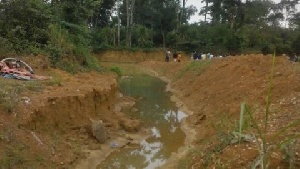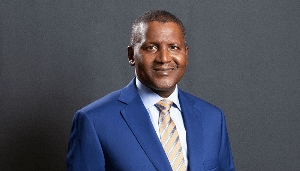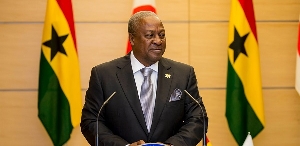Government would sustain the fight against illegal small scale mining, referred to as
galamsey, until there is an appreciable level of environmental recovery in the countryside, as a result of the phenomenon, President Nana Addo Dankwa Akufo-Addo has stated.
However, government is not against mining, but will not accept mining in a manner that risk destroying the environment, and would review its decision on the lifting of the ban on small scale mining, when the issue of galamsey is addressed.
Speaking at a media encounter in Accra, on Wednesday, at the Flagstaff House to mark his first year in government, President Akufo-Addo said his administration inherited a situation where illegal mining or galamsey had become a serious menace to the very existence of the country.
He said Ghana’s forests and water bodies had become degraded, and the health of those engaged in the activity and their communities were all at risk, thus, a holistic approach should be adopted to stem the menace and sustain the environment for the future.
“Let me state here again my gratitude to the media for the support they are giving in the campaign we are undertaking against galamsey.
“This is not a short term campaign, and we need everybody’s support to make a success of it. As I have said a few times, since the Almighty blessed us with precious minerals, there has always been and always will be mining in our country,” he said.
“We are not against mining, but we cannot accept mining in a manner that risks destroying our country. The reforestation programme that we have started should help to regenerate our forest cover and water bodies, and,
hopefully, provide an attractive alternative employment to galamsey. On this subject, all of us, and not just government, have to do things differently.”
On one of his government’s flagship programmes, Planting for Food and Jobs”, the President stated that the
Programme, which registered over 200,000 farmers in the 2017 crop season, has been a big success.
“I am particularly excited about the institutional sub–programmes, where 20 Senior Technical High Schools,
National Service Scheme and the Prison Services were supported to cultivate their own farms. Under the Youth in
Agriculture programme of Planting for Food and Jobs, 10,000 youth were supported to cultivate 800 hectares and 10,320 hectares of rice and maize, respectively,” he added.
Under the Programme, the President noted that average yields of maize and rice have increased, and the country’s warehouses are filling up.
“Whilst the full picture of this success is yet to emerge, it is noteworthy that many farmers have expressed
their satisfaction that, for the first time in a long while, a deliberate government policy has helped to boost their
harvest. We are doing things differently, and we are getting results,” he added.
General News of Thursday, 18 January 2018
Source: ghananewsagency.org

















